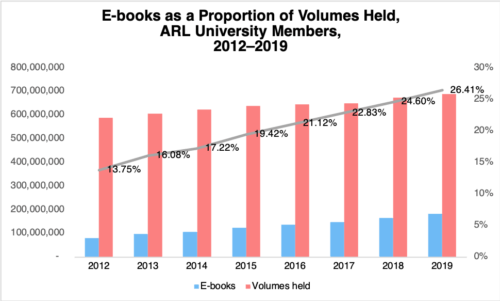In a win for libraries and their users, Maryland is the first in the nation to enact a state law ensuring that libraries can license e-books and audiobooks under the same terms available to consumers.
The new law (Maryland House Bill 518) requires that publishers offer reasonable terms to public libraries when negotiating licenses for digital content. As the president of the Maryland Library Association testified, while the bill specifically names public libraries, academic and university libraries will also benefit from improved terms and business practices.
Both chambers of Maryland’s legislature passed the bill unanimously; the bill will become law without Governor Hogan’s signature. The new law will further Maryland’s policy of ensuring more effective and economical services to all library users.
Even before the COVID-19 pandemic limited access to physical books, e-books were a growing proportion of the US book market. According to the ARL Statistics [login required], e-books held by ARL member libraries as a proportion of volumes held increased from 14 percent in 2012 to 26 percent in 2019 as illustrated in the chart below.
But libraries are sometimes precluded from acquiring and providing access to digital content like e-books. As the American Library Association has pointed out, this lack of access is a market failure that impedes libraries from best serving students, scholars, and other patrons in an increasingly digital world.
US libraries spend over $4 billion annually purchasing or licensing copyrighted works, most of which goes to licenses for digital content. Libraries are subject to pricing and lending terms that publishers set; in some cases, libraries pay five times more than consumers for digital content like e-books and audiobooks, as illustrated in the chart below. Publishers can also delay libraries’ access to new titles, restrict libraries from acquiring some content entirely, and even include digital locks that limit how many times a library can lend an e-book.
Prices of Top 5 New York Times Best Sellers,
September 2019
| Title | Consumer e-book |
Library e-book |
Consumer e-audiobook |
Library e-audiobook |
| The Institute by Stephen King |
$14.99 | $59.99 | $14.95 | $99.99 |
| The Testaments by Margaret Atwood |
$14.99 | $55.00 | $14.95 | $95.00 |
| Where the Crawdads Sing by Delia Owens |
$14.99 | $55.00 | $14.95 | $66.50 |
| The Goldfinch by Donna Tartt |
$11.99 | $65.00 | $14.95 | $65.00 |
| The Titanic Secret by Clive Cussler |
$14.99 | $55.00 | $14.95 | $95.00 |
| Total cost | $71.95 | $289.99 | $74.75 | $421.49 |
Chart source: Testimony in support of Maryland House Bill 518 by sponsor Kathleen Dumais; original source: Central Arkansas Library System
The new state law will require any publisher offering an e-book to the public in Maryland to make that title available to a public library on reasonable terms, enabling libraries to license more books. The Maryland public libraries expect that the legislation will cause publishers to bring down the prices they charge libraries for e-books, although some price discrimination likely will remain. Additionally, the legislation will result in Maryland public libraries obtaining access to titles now available only to consumers.
Similar legislation is pending in other state legislatures, and the adoption of the law in Maryland can be expected to accelerate this legislation.

